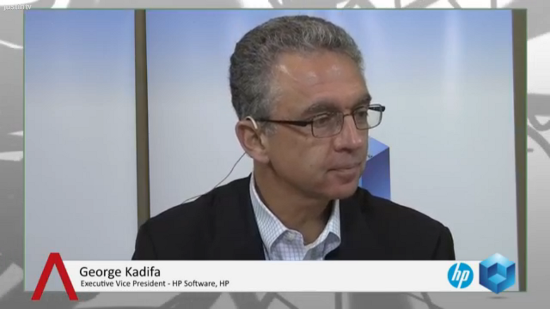 NEWS
NEWS
 NEWS
NEWS
 NEWS
NEWS
George Kadifa, Executive Vice President for HP Software, discussed the company’s take on Big Data trends, the company’s developments around the HAVEn problem, and embracing open source with theCUBE co-hosts John Furrier and Dave Vellante, live at the HP Vertica Big Data Conference.
![]()
HP recently introduced their new platform, HAVEn, “the largest Big Data platform in the industry today” according to Kadifa, and is trying to take advantage of two key drivers. The first is the availability of information, the ability to capture of all kinds of information that is varied – from video streams to tweets. “We are able to capture 100 percent of the information generated for the world,” Kadifa boasts, which HP categorizeS as machine, business, and human data. As Kadifa said, HP is ten time faster in its capability than anyone else. The second key driver is growth — data increasing exponentially in volume.
Diving into technology history, Kadifa mentioned that in the early ’90, a large number of new companies were created. SAP, Oracle, along with several of system integration companies, grew significantly. Accenture, Deloitte and others grew based on information technology and relational information. At this point, there was a massive amount of opportunities with Big Data creating new business models, new customer streams.
HP built HAVEn to take advantage of these opportunities – “a platform that assembles all our capability. Bring Autonomy, Vertica, Hadoop — all these pieces together.” HP thus offers 3 core elements: connectors – about 700 connectors, a strong engine – enabling speed, processing, very capable of taking advantage of the information, and new applications – which will enable building an ecosystem around them, and provide tools to developers.
Asked about HP’s focus on developers, Kadifa said, “developers are not foreign to us, they are core to what we do, we want to do more with developers. We have a huge capability where we’ll be able to deliver the promise of Big Data to our customers and partners.” Right now, HP Software’s Big Data revenue exceeded one billion dollars, representing 25 percent of its revenue.
Commenting on their application system, Kadifa explained it was a marketplace for apps around the Vertica ecosystem. “We want to augment it towards HAVEn,” also using it for the new Moonshot server, with similar software apps running on top of it. Furthermore, some HP enterprise customers want to use it internally as their own app store.
Asked to describe the modern era of software, Kadifa said infrastructure would not only become virtualized, it will become infinite. “It’s going to continue to decrease in terms of TCO. An era of infinite computing resources and an era of infinite information.” In the last three years, humanity has produced more recordable information than ever before. “That’s why we’re building capabilities around platforms like HAVEn where we can inject and index” this infinite information.”We build an ecosystem around it where we’re open, we partner with people, we’re not trying to get monopoly, we focus on customer experience.”
Open source is a key component of HP’s strategy. “We embrace open source. The model of open source creates collaboration, and that is what we want,” Kadifa stated. HP is committed to an open source support to Hadoop. That is also the reason HP has chosen not to release its own Hadoop distribution. “We want to make sure we are as broad as possible. We are in the business to give you options and choices.”
Open source “gives you freedom, it does not give you free software, people are not interested in free. They want to solve a problem,” Kadifa said. Open source creates a platform to collaborate on and solve problem. “We want to maintain that freedom, so that innovation does not stop.”
OpenStack is the instrument compute layer, according to Kadifa. “The market is finally ready, they understand the promise of the cloud, the capability of virtualization.” OpenStack will create a framework where not a single vendor controls the compute stack.” OpenStack is a framework, thus “has to integrate from the API point of view with any hardware platform. It’s a retailer,” he added.
THANK YOU